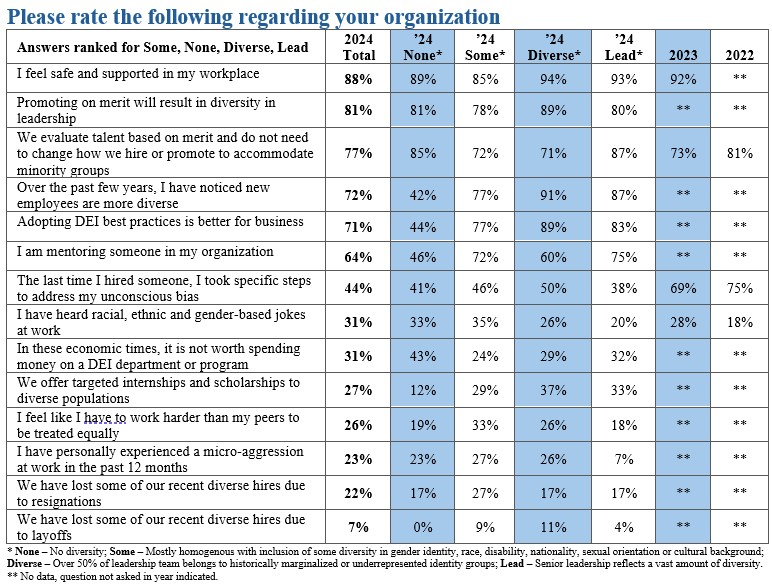Got retention problems? P&C firms with diverse leadership don’t

If your brokerage is looking to solve its labour retention problems, consider this: The more diverse a P&C brokerage’s leadership team is, the less likely staff are to consider leaving their jobs.
So finds a Canadian Underwriter survey, asking P&C industry respondents which factors would cause them to leave their employers or consider other job opportunities. The question is part of an online survey on diversity, equity and inclusion (DEI) issues facing Canada’s P&C firms, made possible with the support of Sovereign Insurance. It received 291 responses.
The Number 1 ranked answer among those working at companies leading in diversity is that they “would never consider leaving this job.” And only a third (33%) of respondents at firms with diverse leadership said they would consider leaving their companies for any of 17 listed reasons (see chart).
Plus, ‘never leaving’ is the Number 2 answer (tied with “better pay, opportunities or fit”) for brokers at companies that have over 50% of leadership belonging to diverse groups.
Comparatively, over half (54%) of overall respondents have considered leaving, or have left their jobs for other opportunities. And that’s slightly higher (59%) at firms with no diversity in leadership.
Those at companies with some or no diversity in leadership rank “toxic co-workers or work environment” as the primary reason they’d consider leaving their jobs.
“Being a woman, I’ve been subjected to many adverse situations, including sexual harassment, but mostly men ignoring the voice of women and often stealing my ideas to promote their own career advancement,” says one respondent in eastern Canada.
For those whose companies sport no diversity, “lack of career advancement opportunities,” and “unmanageable workload” are the next two reasons they’d consider a job change.
“Experienced insurance professionals are constantly overloaded with their work and some eventually leave the industry as a result,” says one broker out West.
And there are other motivations to change jobs. One Gen X broker out West cites “Corporate mismanagement that was too hard to ignore.” And a veteran broker in Quebec says she changed jobs because her new company offers a shorter commute and better access to parking.
Overall, CU’s DEI survey, fielded in Feb. and Mar. 2024, finds 13% of respondents saying their company’s senior leadership reflects a vast amount of diversity.
What’s more, 16% say more than 50% of their leadership team belongs to historically underrepresented groups, 48% say their leadership team has some diversity but is mostly homogeneous, and 23% say their leadership team has no diversity.
Beyond staying power
It’s not just retention. Recruitment and mentorship also are emphasized at companies that lead in diversity, according to the survey results.
For example, brokers at organizations with diverse leadership are more likely (75%) to be mentoring someone at work than those at organizations with no diversity (46%). They’re also more likely to offer internships and scholarships targeted toward diverse populations (33% versus 12%).
That said, most brokers (88%) say they feel safe and supported in the workplace — though the scales tip in favour of those working at companies with diversity in leadership (94%).

Yet, brokers working at organizations without diversity in senior leadership are more likely to agree (43%) that, “In our our era of high inflation and business costs, it is not worth spending money on a diversity and inclusivity department or program.” By contrast only 32% of respondents at organizations with diverse leadership see diversity programs as an unnecessary expense.
Meanwhile, brokers at organizations with no diversity in senior leadership are more likely (27%) to say they’ve personally experienced micro-aggressions at work in the past 12 months. That compares to 7% at firms with diverse leadership.
“As a white male many of these do not impact me,” says one millennial respondent out West. “However I have seen the impact on my colleagues who are part of these groups.”
Another 33% of brokers at companies with no diversity in leadership say they’ve heard racial, ethnic and gender-based jokes at work, compared to 20% at companies that lead on diversity.
Feature image by iStock.com/filadendron



